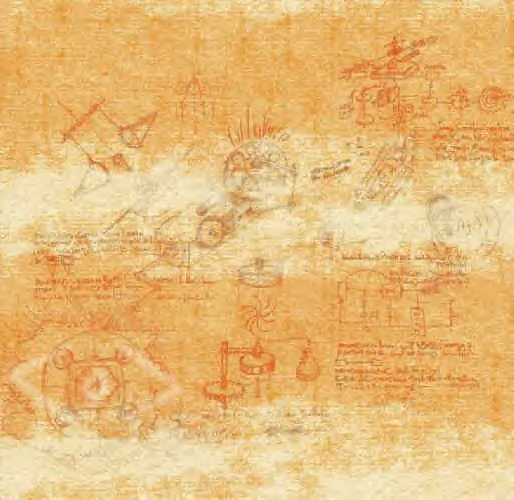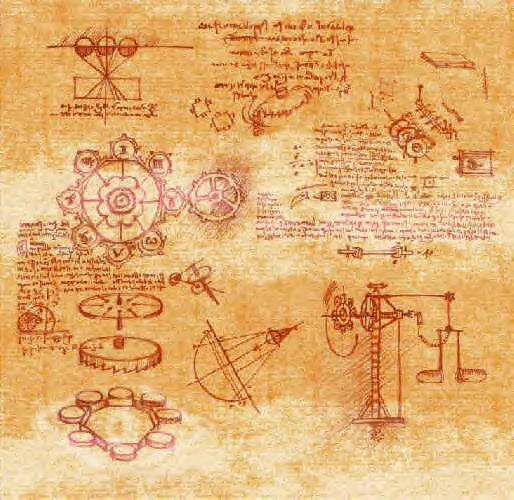
Milo Giacomo Rambaldi b. 1444 - d.
1496
Prophet and Seer...Psychic and Alchemist
I believe
Rambaldi, whose works are a main theme of the TV series Alias, was convinced
that there were people with powerful telepathic abilities among the human
population. I have used a series of his own drawings to show this.

This telepathic ability can be done over extremely long
distances, as would logically necessitate some sort of transmission
assistance device, although none was in evidence. The above drawing shows a
model of how such a device might work mechanically and electromagnetically.

There being no transmission assistance, this implies that
humans themselves are the transmission media and that for the phenomena to
exist over long distances a significant percentage of the population must be
part of this transmission process.

Rambaldi sought to create a device that would allow
eavesdropping by a non-telepathic individual of the transmitted telepathic
conversations.

Rambaldi believed the process took place as an audio
phenomena, and strived to develop a comprehensive mechanical model of the
inner ear.

Similar to the number of musical notes in an octave,
Rambaldi designed a mechanical device with eight gears so that it would be
able to duplicate the full range of sounds audible by the human ear.

Each gear was at a different pitch, or angle of
inclination, in order to generate the desired affect ~ presumably a
duplication of the human voice.

The assembled device would allow a non-telepathic
individual to literally hear the telepathic conversations by causing the
excitement by the transmitted "psychic" energy of the small bones of the
inner ear.
Evidently the Church thought there was something to this
device and Rambaldi's effort to design it, because they persecuted him and
tried to destroy every vestige of his designs and his workshops. (See the
biography of Rambaldi at the bottom of this page.) These few parchment
fragments are all that remain, but fortunately they are enough to outline
Rambaldi's thoughts and intentions. The big question is, are there really
telepathic individuals? Evidently the Church believed so.
In the
modern day, it is clear that the Jews are "the matrix" and that they got
this psychic ability by coitus with Leviathan, the extra-terrestrial
creature of the Book of Job in the Bible. (Later, the "golden calf" they
absconded with during the Exodus.) The Church sought to excise these
individuals from the gene pool (Jesus, the Disciples, and all the original
Christians were Jews) by imposing celebacy upon priests. On the other hand,
the Jews sought to enhance their abilities, by forming a closed society
prohibiting any intermarriage with "gentiles." This reached the final phase
with the Holocaust which, I believe, was orchestrated by radical
fundamentalist Jews who followed the teachings of Rabbi Kotzker upon
reformist Jews who followed the Baal Shem Tov, with the help of
fundamentalists in America. These Americans were centered on George Walker
Bush, Sr. the grandfather of President Bush, who was the senior partner at a
major Wall Street firm that funneled billions of dollars to the Nazis during
the 1930's - money which put the Nazis in power, and kept them in power.
Apparently another Leviathan was gotten into captivity following the
UFO crash at Roswell in 1947. It took a couple of decades before the
Americans figured out how to create alien-human hybrids, and another
generation to realize they had psychic abilities. Eventually they figured
out what the Jews were up to, and together they made 9/11 happen (the
Israelis facilitating the attacks by the fundamentalist Arabs by disabling
the aircraft black boxes and homing beacons, short circuiting security,
etc.. and the American Nazis based at the University of Texas at Austin
doing the structural analysis of the Twin Towers to show where the aircraft
needed to impact for a perfect implosion), after which time they operate as
one under the auspices of the American Gestapo, The Department of Homeland
Security.

This short biography is from the TV show Alias' official
website. (One theme of the show is a search for Rambaldi's lost works.)
Born in Parma in 1444, Rambaldi was educated by monks of the
Vespertine order, and until the age of 12, was self-employed as a painter,
sculptor and student of the arts. Introduced to Cardinal Alexander of the
Roman Catholic church, during his travels to Rome at the age of 18, he was
retained privately as architect, consultant and prophet, when Alexander
became Pope in 1492.
Despite this benefactor's wishes to see
Rambaldi prosper, during his lifetime Rambaldi and his works receded from
visibility by commandment of Archdeacon Claudio Vespertini, who feared the
revolutionary implications of technologies defined in Rambaldi's belief
system, and sought to have Rambaldi's works contained and eventually
eliminated. He conflicted with Alexander VI on this one matter; a moot point
at the time of the Pope's passing in 1503.
Vespertini commanded that
the name Rambaldi be "washed" from all monuments and edifices throughout the
period of 1470 to 1496, at which time he ordered that the Pope's engineer be
excommunicated for heresy, his workshop in Rome be destroyed, and that he be
sentenced to death by flame, upon Rambaldi's declaration that science would
someday allow us to know God.
Milo Rambaldi died a lonely man, in
the Winter of 1496. He had no surviving spouse or heir. Shortly after
Rambaldi's demise, a second, "secret workshop" was discovered, in San
Lazzaro, and was systematically torn apart by agents of the Vatican. In a
movement to discredit his work and influence, plans and sketches were sold
and traded for next to nothing by mandate during a private auction. Since
the 15th century, traces of Rambaldi's enigmatic work have turned up in
various places around Italy, France, parts of Eastern Europe and the former
Soviet Union, and even a museum warehouse in Waterbury, Connecticut in 1921.
The design directive for many of these drawings remains unclear to this day,
and has even inspired some impressive forgeries.
Rambaldi is said to
have preceded the digital information age by implication of an illustrated
"machine code" language as early as 1489, through the introduction of
cryptic algorithms (eg, compression) around his use of pre-binary 1's and
0's. Many of his drawings and documentation are written in multiple
languages ranging from Italian and Demotic hybrids, to elusive mixtures of
symbols (pre-masonic cipher encryptions).
Rambaldi created the
earliest known watermark on all of his papers, known as the "eye" of
Rambaldi, and which show up to the naked eye only when held to black light.
His waterpapers were all hand-made and of a unique polymer fiber (similar to
onion skin), and possessing a consistency that has lived and aged
well-beyond its era, and in under (oftentimes) adverse storage conditions.
His watermark (the eye "") is so far the only test of accuracy against
the slew of falsifications and forgeries, which have also arisen in a
revisionist era, culminating with several prime examples of digital piracy.
So far there have been 102 known forgeries in balance to the total of 22
known and documented sketches.
Documents interpreting Rambaldi's
designs and teachings were highly sought-after during the Third Reich,
during Adolf Hitler's paranoid scavenger hunt for occult and theoretical
knowledge. During this period, the epithet "Nostravinci" became part of the
fuhrer's private lexicon -- a personalized short-hand for the name Rambaldi,
in auctioneering circles where the desire for the seer's work still proved
competitive.
Rambaldi's works are still, to this day, formally
unpublished, due to a consistent international ban on the name Rambaldi, its
fascistic legacy, and especially its lack of visibility; it has been alleged
that a conspiracy of containment precedes many of these twentieth-century
discoveries, even that the knowledge contained under private sanctioning of
his documents remains under the firm "hand" of the Trilateral Commission.
In 1988, a rudimentary schematic unearthed in one private
collector's home in Brazil, indicated on the back, a diagramme for a
transportable vocal communicator revealed the design and workings of
contemporary cellular phone technologies.
Since March of 2001, (KDir
Classifications Director) Olgi C. Krystovnich (b. 1964, Russian historian
and cryptologist) happened upon one of Rambaldi's earliest designs, ca.
1460, located and released from a personal collection in Madrid. In this
drawing, she identified a prototype that reflected the properties and
composition of a 20th century transistor design.
The remainder of
Rambaldi's oeuvre remains forgotten, and much of it has been destroyed, with
much uncertainty remaining as to how many notebooks he might have filled
during the fifty-four years of his life.
© 2003 bill h. clark
ii
________________________________








